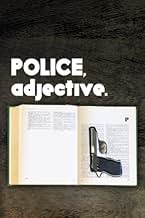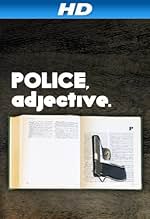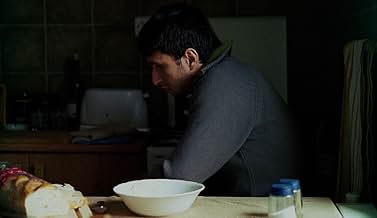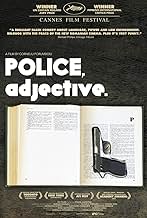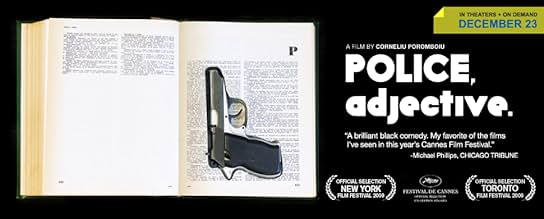NOTE IMDb
6,9/10
5,5 k
MA NOTE
Ajouter une intrigue dans votre langueA police officer refuses to arrest a young man for offering drugs to his friends.A police officer refuses to arrest a young man for offering drugs to his friends.A police officer refuses to arrest a young man for offering drugs to his friends.
- Réalisation
- Scénario
- Casting principal
- Récompenses
- 15 victoires et 15 nominations au total
George Remes
- Vali
- (as Remes George)
Constantin Dita
- Officer on Duty
- (as Costi Dita)
Avis à la une
As a romanian I can not believe that some people actually liked this. The action is so slow. I mean we spend 10 minutes watching the main character eat soup, in another scene we see him for about 15 minutes undressing when he comes home.
I mean ... come on what were they trying to do ? Waste film. IMHO
As for the directing goes I have no objection, as this is very easy to film.
You can honestly fit the script into 1 A4 page. Just trash IMO. But that does not mean that we do not make good films.
Better luck next time.
I mean ... come on what were they trying to do ? Waste film. IMHO
As for the directing goes I have no objection, as this is very easy to film.
You can honestly fit the script into 1 A4 page. Just trash IMO. But that does not mean that we do not make good films.
Better luck next time.
In "Police, Adjective", Romanian director Corneliu Porumboiu devotes himself to the story of a small town cop reluctant of busting a minor for endorsing hashish with friends. Although vague at first, we learn that the civil police Cristi is having an unease conscience about nailing the young man, which may inflict seven years in prison for what Cristi believes to be a petty crime that will – soon enough – be looked upon more liberated. Throughout pic we follow his daily routines and interactions in the downbeat and austere town of Vaslui, including scenes of parodic bureaucracy and laudable lengthy takes.
"Police, Adjective" is admittedly in many ways difficult to interpret. The first half of the film deals with classic police work (classic as in reality, not classic as in previously depicted on film) including Cristi's pursuit of suspects and filing reports. For an audience used to clustered action flicks, this may seem as tedious and unbearable to endure. From a more objective perspective, I find it somewhat original and daring. This course of the film is harmless, it is on the contrary a certain, yet inevitable cul-de-sac initiated by a mere typo, that pushes it in a slightly too academic stand. On the other hand, it could also be considered an ironic twist when deciding how Cristi's moral dilemmas should be solved.
One of the more unfortunate aspects of Porumboiu's directing, in particular substantial for "Police, Adjective" but nonetheless equally visible in previous film "12:08 East of Bucharest", is that the (black) humor sometimes may appear so subtle that when juxtaposed to foreigners it can be completely lost (in translation.)
Watching Porumboiu's battle between an objective and supreme law versus Cristi's subjective conscientious law is evidently quite fascinating, despite being a bit too submissive at times.
"Police, Adjective" is admittedly in many ways difficult to interpret. The first half of the film deals with classic police work (classic as in reality, not classic as in previously depicted on film) including Cristi's pursuit of suspects and filing reports. For an audience used to clustered action flicks, this may seem as tedious and unbearable to endure. From a more objective perspective, I find it somewhat original and daring. This course of the film is harmless, it is on the contrary a certain, yet inevitable cul-de-sac initiated by a mere typo, that pushes it in a slightly too academic stand. On the other hand, it could also be considered an ironic twist when deciding how Cristi's moral dilemmas should be solved.
One of the more unfortunate aspects of Porumboiu's directing, in particular substantial for "Police, Adjective" but nonetheless equally visible in previous film "12:08 East of Bucharest", is that the (black) humor sometimes may appear so subtle that when juxtaposed to foreigners it can be completely lost (in translation.)
Watching Porumboiu's battle between an objective and supreme law versus Cristi's subjective conscientious law is evidently quite fascinating, despite being a bit too submissive at times.
The Romanian film wonder goes on and what's wonderous about it is that it's not afraid of life, like most movies around the world are. Since the beginning of the 1900s, there's an agreement about that life being absolutely boring. Lucky thing you can cut the film.
But here, we follow the young policeman on a routine mission, trying to investigate a supposed drug crime. The camera goes on for ten minutes, nothing happens or more likely...everything happens. What's morality about. Following the law or following your conscience? Or is it the same thing? Or should it be? An action drama there the action takes place inside the characters and the viewers. And that's absolutely fair enough.
But here, we follow the young policeman on a routine mission, trying to investigate a supposed drug crime. The camera goes on for ten minutes, nothing happens or more likely...everything happens. What's morality about. Following the law or following your conscience? Or is it the same thing? Or should it be? An action drama there the action takes place inside the characters and the viewers. And that's absolutely fair enough.
One of the best movies of the year - and, definitely, of the Romanian cinema all over.
After "12:08: East of Bucharest" (aka "A fost sau n-a fost" - original title), Cornel Porumboiu does it again: an incisive and tender, empathic and ruthless look into our contemporary humanity. It brings back memories of Kafka's "Trial": the blind mechanism of Law, meant to help us live better and, because of so many machine-like people, turned into a device for destroying lives. In the role of the young policeman who loses his faith into the system, Dragos Bucur brings on screen another of his memorable performances - subtle, deep, finely tuned.
But the main virtue of this excellent movie, of course, is Cornel's directing - credible, original, precise. The static long shots, creating pent-up inner tensions... the unbearable waiting scenes, under a leaden sky... the discrete plastic compositions of the frame... the insidious rhythm... the careful attention to the minutest details - everything, with a due meaning and a perfectly weighted impact.
Special kudos for the pivotal scene built up around Mirabela Dauer's song "I Don't Leave You Love" - a rare piece of abstruse idiocy, used as a main axis for the protagonist's confrontation with the life's absolute absurdity. The scene is so masterfully built and shot, that it makes us scream laughing (in Cannes, the audience was delirious) - but the ultimate meaning is tragic... this being Porumboiu's definitory characteristic - as he said himself: "comical authors are often the saddest ones of all".
After "12:08: East of Bucharest" (aka "A fost sau n-a fost" - original title), Cornel Porumboiu does it again: an incisive and tender, empathic and ruthless look into our contemporary humanity. It brings back memories of Kafka's "Trial": the blind mechanism of Law, meant to help us live better and, because of so many machine-like people, turned into a device for destroying lives. In the role of the young policeman who loses his faith into the system, Dragos Bucur brings on screen another of his memorable performances - subtle, deep, finely tuned.
But the main virtue of this excellent movie, of course, is Cornel's directing - credible, original, precise. The static long shots, creating pent-up inner tensions... the unbearable waiting scenes, under a leaden sky... the discrete plastic compositions of the frame... the insidious rhythm... the careful attention to the minutest details - everything, with a due meaning and a perfectly weighted impact.
Special kudos for the pivotal scene built up around Mirabela Dauer's song "I Don't Leave You Love" - a rare piece of abstruse idiocy, used as a main axis for the protagonist's confrontation with the life's absolute absurdity. The scene is so masterfully built and shot, that it makes us scream laughing (in Cannes, the audience was delirious) - but the ultimate meaning is tragic... this being Porumboiu's definitory characteristic - as he said himself: "comical authors are often the saddest ones of all".
This film is good... by contrast last night I watched Two Women with Sophia Loren (1960)...a film that had a veritable circus of characters none of which stayed with me more than 15 minutes.
I will remember Christi in this film for a long time. Yes it is slow at times especially the scene of them waiting in the office to see Christi's boss. And the dictionary sequence was tedious. But the pay off is you come to really know this character.
This is just the sort of film I like to stumble on.. something that stays with you. Distant (A Turkish film) is a similar slow moving film.
One actor has to carry this film entirely for almost two hours--it was a flawless performance by him.
I will remember Christi in this film for a long time. Yes it is slow at times especially the scene of them waiting in the office to see Christi's boss. And the dictionary sequence was tedious. But the pay off is you come to really know this character.
This is just the sort of film I like to stumble on.. something that stays with you. Distant (A Turkish film) is a similar slow moving film.
One actor has to carry this film entirely for almost two hours--it was a flawless performance by him.
Le saviez-vous
- AnecdotesRomania's official submission to 82nd Academy Award's Foreign Language in 2010.
- Bandes originalesNu te parasesc iubire
Performed by Mirabela Dauer
Arranged by Dan Dimitriu
Lyrics by Dan Ioan Pantoiu
Produced by Roton Music
Played and discussed at Cristi's home
Meilleurs choix
Connectez-vous pour évaluer et suivre la liste de favoris afin de recevoir des recommandations personnalisées
- How long is Police, Adjective?Alimenté par Alexa
Détails
Box-office
- Budget
- 800 000 € (estimé)
- Montant brut aux États-Unis et au Canada
- 53 206 $US
- Week-end de sortie aux États-Unis et au Canada
- 19 452 $US
- 27 déc. 2009
- Montant brut mondial
- 162 974 $US
- Durée
- 1h 55min(115 min)
- Couleur
- Mixage
- Rapport de forme
- 1.85 : 1
Contribuer à cette page
Suggérer une modification ou ajouter du contenu manquant




